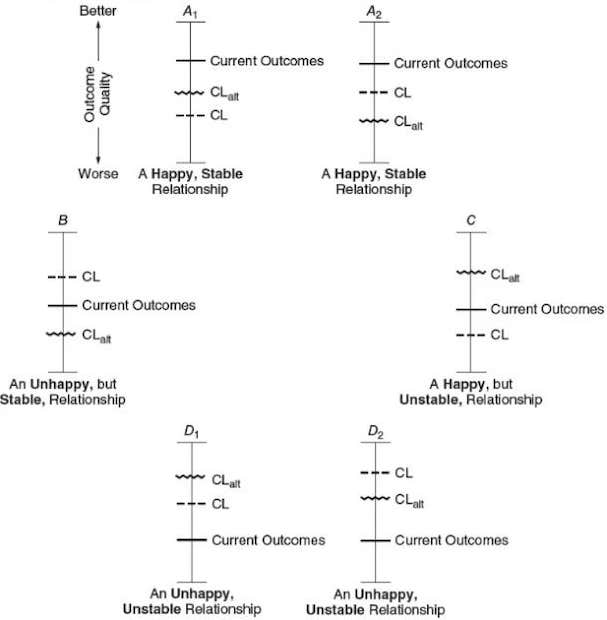You Can Use Math To Predict Whether Your Relationship Will Last
The mathematical equation of Interdependence Theory can actually help you predict whether or not your relationship will last.
 Volodymyr TVERDOKHLIB / Shutterstock
Volodymyr TVERDOKHLIB / Shutterstock Are psychologists fortune tellers? Well, if one of the purposes of psychology is to understand (and thus predict) behavior, then yes, there’s a little bit of fortune telling involved.
Not all psychology is about predicting the future, but if you give a relationship researcher a few pieces of information, they’ll be able to tell rather accurately how strong your relationship is and how likely you are to stay together.
Trust me, I didn’t want to listen to these theories at first either. They sound so … callous.
In these models, relationships are viewed as a (mostly) transactional combination of risks and rewards, of contributions and benefits. That is, people enter relationships because they get something out of it, and what they get is usually more than what they give.
"Okay, but what about love?" you ask.
Sometimes we do stay with people just because we love them, even though we get nothing out of it.
Well, I wouldn’t call “love” nothing, but think about it for a second ... Would you really stay in a relationship if you got absolutely nothing out of it? Like, not a thing, not even a feeling of security or commitment? Would you enter into a relationship with a perfect stranger who will just ignore you? Because that would be a relationship where you get nothing.
There’s actually a good deal of debate about whether altruism truly exists, but few of us stay in romantic relationships for altruistic reasons. Guilt, dependence, “for the kids," financial security ... sure. But altruism? Not so much.
So, what makes us stay with our partners?
While there are theories about commitment, today I want to focus on the big picture — the model that takes pretty much everything into account. It’s a little bit rough and it might seem simplistic, but apparently, it can predict the longevity of relationships with a good degree of accuracy.
The specific model I'm writing about is known as Interdependence Theory (but I’ll try not to bother you with too much psychological jargon).
Interdependence theory can be used to predict how long a relationship will last.
Interdependence Theory considers three variables:
1. Comparison level (CL)
This is what you think you deserve, or what you want out of a relationship.
2. Comparison level of alternatives (CLalt)
This is what’s available to you outside of your current relationship.
3. Current outcomes
This is what you are actually getting.
Some of these break down a little further. The outcome of your relationship depends on the sum of your rewards minus your costs. Positive outcomes mean that what you get out of the relationship is worth more than what it costs you to be in it.
Of course, rewards and costs are different for everyone. For me, costs are things like less time for myself, energy used socializing and emotional labor. My rewards are intimacy, connection, sex, someone who listens to me, support in tough times, etc.
Whether you’re satisfied or unsatisfied in your relationship depends on your CL, i.e., what you believe you deserve.
You could be seeing positive outcomes with someone, but if your comparison level is higher than your outcomes, you’re still going to feel unsatisfied overall. If your outcomes are equal to or greater than your comparison level, you’re going to feel satisfied.
How dependent you are in a relationship is based on your outcomes and the comparison level of your perceived alternatives (CLalt).
These alternatives do include being single, by the way! Sometimes being single is better than staying in a bad relationship.
If your outcomes are better than your alternatives, it means you are rather dependent, because your perception is that whatever’s out there is worse than what you’re currently getting. However, if you perceive your alternatives as better than your current outcomes, this means you’re independent — you don’t necessarily need your partner around because you believe that you can do better elsewhere.
The Equation
Although there are six different possibilities, there are only four types of relationships in this theory. You’ll see why right below.
 Photo: Miller (2015)
Photo: Miller (2015)
In this model, relationships are evaluated based on their happiness and stability.
A relationship is unstable if either person believes there are better options elsewhere and it’s unhappy if you don’t think you’re getting what you deserve. Therefore ...
If your outcomes are better than both your alternatives and what you think you deserve, you’ll stick around.
If your outcomes are worse than both your alternatives and what you think you deserve, your relationship is not going to last much longer.
The tricky stuff happens in the middle when one or the other seems better than your current outcomes.
You can be happy but still see something better elsewhere, in which case you’re probably going to jump ship at the earliest opportunity.
Or you can feel like you have a bad relationship, but because you believe your alternatives can only get worse, you’re going to stay for the long-run anyway.
The Results
Everyone has different expectations and beliefs about what makes a good relationship, so you’re the only one who can tell whether your expectations are being met in your current relationship.
For example, I could only leave a past relationship when I realized my alternatives — any alternative, really — were all better than my current outcomes. For a long time, being single wasn't a viable option for me, but it became so once I realized that if I stayed, I would never ever have a satisfying sex life. Even the financial penalty of living alone didn’t seem so bad once I adjusted my comparison level and redefined what I believed I deserved.
Of course, your concept of what constitutes a viable alternative can change with time.
An extreme example would be finding your gentle but ugly neighbor more compelling once your current partner starts beating you. (It doesn’t have to be that bad, but you get my point.) And the same goes for your concept of what you deserve.
A person with low self-esteem will put up with a lot of shit because they don’t think they deserve better; but send them to therapy and see them improve their self-esteem, and they’ll quickly adjust their expectations accordingly.
There are also people who think they deserve so much they will never find anyone who will fulfill their expectations.
You can desire to have a relationship with only the hottest, richest and kindest people, but realistically, will you ever find that particular combination in any one person? These people are chronically unsatisfied. Nothing will ever make them happy enough.
Another issue some people face is they get used to certain outcomes, then find they don’t seem as good as they once were. A partner who makes you breakfast in bed every week is awesome … at the beginning. After a few years, this one act may not have the same effect, and the relative benefit of this particular perk will lose value in your mind.
However, there’s (yet another) crux.
People are rarely neutral enough to evaluate their own relationships, especially their outcomes. Due to biases, we make ourselves believe things are better than they are because otherwise, we’d have to reevaluate A lot of our decisions … and we don’t like having to that.
There's another reason hindsight is always 20/20. We’re not so emotionally involved in past decisions as we once were, and we can see the situation with a greater sense of perspective.
So, what can you do with this theory?
My hope is to give you an different perspective on how psychologists actually explain romantic relationships. It’s given me a more abstract, detached way to look at my past and current relationships and has helped me explain past behavior I hopefully won't repeat in the future.
I hope it will encourage you to take a good look at where your relationship fits in the above graph. Are you really getting what you want, or are you sticking around because there’s nothing better out there?
Remember the importnat factors of interdependence theory: Stabilty, happiness, outcomes, alternatives.
Anabelle Bernard Fournier is a freelance writer and researcher, focusing her efforts on various topics including sexual and reproductive health, sociology of sexuality, medical ethics, and health care.

